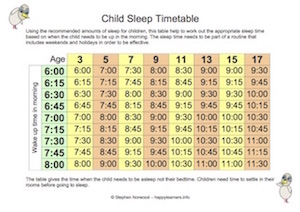Develop a sleep routine
Keep to a strict time to go to bed each night. Staying to the same bedtime every night including weekends and holidays helps the body maintain a healthy natural 24 hour sleep cycle.
Follow a bedtime routine e.g. shower/bath followed by reading in bed. Parents should continue reading to their child at bedtime as older children enjoy an age appropriate story as much as younger children.
Optimise the Sleep Environment
Reduce light levels at least an hour before sleep time. Use table lamps rather than room lights. Minimise time in kitchens and bathrooms with strong lights. Dimming lights and using 'warm' bulbs can significantly improve conditions for the onset of sleep.
Keep the temperature of the room to no more than 22 degrees Celsius with 16 - 18 degrees being ideal.
Ensure good ventilation to prevent the bedroom getting to stuffy but avoid draughts particularly in cold weather.
Use of black out curtains and/or blinds can be very beneficial particularly in summer months when it is still light outside. Also useful for blocking out street and security lighting etc. Older children and teenagers may be able and willing to wear eye blinds to help them sleep when there is unavoidable light. This could be a solution for siblings where there is disagreement over night lights, door open etc.
Prescribed Melatonin
Some children with sleep difficulties may be prescribed melatonin by their family doctor or consultant. When initially prescribed melatonin can appear as a panacea or 'magic bullet' solving the sleep difficulties almost overnight. However it is really important to use this time to re-establish a sleep routine using the other strategies described here. Otherwise there is a tendency for the prescribed melatonin to become less effective over time.
Avoid Stress
Stress releases cortisol, a brain chemical which make us more alert. It also reduces the body's level of melatonin, the natural hormone that helps us sleep.
Avoid children watching TV or playing computer games in the hour before going to bed. Always build in time for bedtime routine.
Avoid your child watching films and TV or playing computer games containing distressing, frightening or violent themes. This includes the news.
Drawing, colouring in or doodling whilst listening to a story are excellent ways of promoting pre-sleep relaxation. Massage, breathing exercises and listening to music are also useful ways to get the body and mind calm and ready for sleep.
Fresh air and exercise
Physical exercise during the day can be useful for tiring your child out but avoid it in the hour or so before bedtime.
It is also important to expose your child to daylight in the morning to help reset the body's natural sleep clock, the Circadian Rhythm.
Sleep Diet
It is important to avoid food and drink containing caffeine in the evenings. This includes food and drinks containing chocolate.
It is also advised to avoid sugary drinks and foods in the hour or so before bedtime as this can raise blood sugar levels and cause restlessness.
Some foods naturally contain melatonin, the important chemical in the body for sleep. In addition many foods that we eat contain tryptophan which is used to make melatonin.
You may also be interested in a similar article on sleep written for parents in response to a workshop question:







